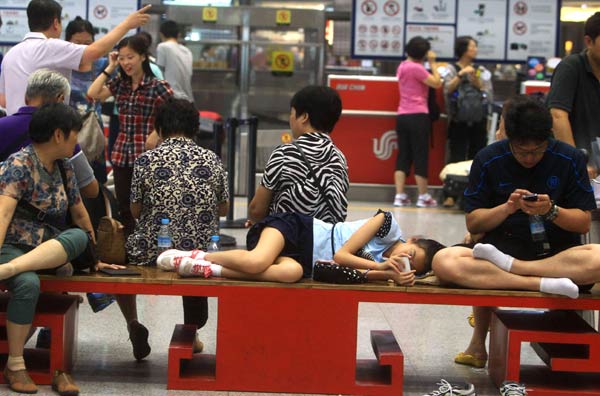Airlines battle passenger fury over delays
|
Passengers wait for announcements of their flights in Beijing on Sunday. Hundreds of flights were canceled or delayed due to storms. Cai Daizheng / for China Daily |
Civil aviation authorities vow to improve timekeeping
Flight schedules may sometimes appear as if they are up in the air, but Chinese airlines say they are striving to improve amid passenger anger over poor punctuality.
Air China, the country's leading carrier, said in a statement to China Daily that it has drafted response plans for bad weather and other circumstances that can cause delays.
It said it is cooperating closely with meteorological departments and airports to ensure extreme weather conditions and other possible occurrences do not seriously affect flight schedules.
The company also pledged to improve internal coordination and passenger service in the event of delays or schedule changes.
Air China said that if a flight is postponed, it sends text messages to passengers and notifies ticket agencies to inform customers.
A display screen will be placed at each of the company's counters to show weather satellite images from meteorological departments, according to the statement.
The Civil Aviation Administration of China has vowed to take tougher measures to improve punctuality.
Airlines with a less than 50 percent on-time departure rate and which rank among the last 20 percent on punctuality will be issued a warning and asked to take remedial measures.
If a route is given two warnings in a month, the authority will revoke the airline's license for that route.
If a flight is delayed for more than four hours, resulting in huge protests due to bad arrangements, the airline will be stopped from operating the route.
Zhang Wuan, spokesman for Shanghai budget carrier Spring Airlines, said the company's punctuality level has remained at about 80 percent over the years.
"Usually, we reserve a certain number of aircraft and crew in case of any emergency," he said. "In addition, we cut down flying hours for our crews during the summer to ensure they won't work overtime."
Flight schedules are arranged several months in advance, he added, and in most cases delays are not caused by airlines.
"Many passengers may have had to wait on board for hours before takeoff and this is usually caused by air traffic control," Zhang said.
China's eight busiest airports, including Beijing, Shanghai, Guangzhou and Shenzhen, have been prohibited from using air traffic control as an excuse for delaying flights, according to sources.
One unidentified source with the air traffic management bureau under the Civil Aviation Administration of China was quoted by the Oriental Morning Post as saying the bureau is looking at the consequences of the new measures.
According to insiders, air traffic control is often used as a convenient, catch-all excuse, and can refer to extreme weather, military use of airspace, equipment failure, or an ill-arranged schedule.
Some analysts expect the punctuality of domestic flights from the eight airports will see a substantial improvement after implementation of the new policy, but others doubt that much will change.
"It's like a road with room for 100 cars, and then 200 cars swarm onto it. You have to make arrangements," said an official with the air traffic management bureau who did not want to be identified.
He questioned what a pilot should do if a flight cannot land at a designated airport because of air traffic control.
"Waiting for a landing up in the air is not a good solution. It burns more fuel and increases passenger anxiety," he said.
Huang Jinxiang, an industry analyst with Haitong Securities, said the third quarter is the traditional peak season for flights, and there are frequent thunderstorms from June to August, affecting flights extensively.
Jiang Jintao, a medical worker in Tianjin, said: "It is understandable that rain or thunderstorms will ground flights, but what passengers want is merely that the airline give us a clear explanation and notice in advance instead of always referring to air traffic control and keeping silent about schedule changes.
"I know airlines are not able to change the situation solely by themselves, but I hope they can show more respect to passengers and improve service."



















